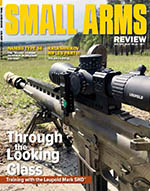NFATCA Report: V22N7
By Jeffrey Folloder
Questions & Answers
Another Knob Creek shoot is in the books, and the NFATCA is heading to Dallas, Texas for the NRA Annual Meeting. We make the effort to attend many events so that we can perform one of our most crucial tasks as a service organization: membership outreach. There is always a steady stream of questions to be answered. Many of the questions are ones that we have heard many times before and quite regularly throughout the years. Others present a new twist on an old inquiry, and a few are genuinely new or novel. Perhaps it is time to review the common things we hear and point folks toward trusted resources?
A gentleman sidles up to our tables at The Creek and offers a furtive glance to the left and to the right. In hushed tones he begins to regale us with the story of how he discovered a Maxim suppressor at a garage sale in his hometown last summer. The gentleman confirms that he is a “fully legit” licensed 07/SOT manufacturer who plays by all the rules. He wants to know how he can go about registering his garage sale find. “You cannot.” “But I’m an 07! All I need to do is mark it with my information and file the Form 2.” We’ve gone through this ballet repeatedly over the years and have to explain that what he has is contraband. It was legal back in the day. It could have been registered during the one and only NFA amnesty. But now it is just contraband as an unregistered NFA item. You simply cannot register the unregisterable. Whether it is a Maxim can, an unregistered H&R Handy Gun or that bring-back machine gun in Grandpa’s attic, we must sadly refer the inquirer to the dictum: You cannot register the unregisterable.
“I broke up with my girlfriend. She told the cops that I was a bad guy, and now there is a domestic order on me. ATF came by and says I need to give up all of my guns. I’m an FFL!” This is where we have to explain why they really need competent legal counsel, that under the law they are currently a prohibited person and may not be in possession of firearms. This is also one of the points where we remind people why it is a good idea to have back up Responsible Persons (RP’s) on a license.
“I have never exported anything that I make as a manufacturer. The Internet says that I do not have to pay ITAR.” The Internet is wrong. Under current State Department administration of federal regulation, anyone who fits the description of manufacturer as the State Department defines it, must pay ITAR each and every year. Period. “I just do R&D. I never sell anything!” Doesn’t matter. Unless you are an accredited institution of higher learning, you will not qualify for a State’s R&D exemption. You may have slid under the radar in the past, but State will catch up. Every single 07 FFL in the United States is listed in Excel spreadsheet format in plain view on ATF’s website. And ATF’s inspectors are now asking about ITAR status. There is hope for ITAR being rolled back, but it has not happened yet. Register and pay each year or face the possibility that State believes you to be willfully avoiding your obligation.
“You guys are working on opening up another amnesty registration period. Cool! I’m going to head to my shop and whip up some machine guns and just wait until I can register them under amnesty.” It doesn’t quite work that way. The future possibility of an amnesty would not give persons incentive unlawfully to make NFA firearms with the idea of registering them under an amnesty. It is unlawful “to make a firearm in violation of the provisions of this chapter,” 26 U.S.C. §5861(f), and it would be unlawful to possess it thereafter (§5861(c), (d); §922(o)). A person who makes firearms before an amnesty could be prosecuted under all of these provisions. While an amnesty would immunize a person from the possessory offenses, the person could still be prosecuted for unlawfully making a firearm. (NOTE: Odds are that any potential Amnesty would be restricted at the very least to items made before 1986 and in all probability to before November 1968).
No, buying or registering an NFA weapon does not give ATF permission to come kick down your door, shoot your dog and inspect your firearms at any time. Yes, you can hunt with a suppressor in many states these days. How an NFA trust is written does make a difference. Some are great, some are not quite great, and some are particularly worthless … You get what you pay for. We get lots of questions, and we are happy to point folks in the right directions.
There are three main resources that the NFATCA will send folks to: the NFA Handbook (originally written by the NFATCA and currently available on ATF’s website); the eRegulation resource for firearms regulations available at regulations.atf.gov; and competent legal counsel. The last resource is never minimized because there simply is no substitute for engaging a professional when dealing with matters involving criminal or civil jeopardy. We answer questions when we can, find out more information when we come up short and will make connections with legal counsel for those who need it. We thank you for your continuing support!
This article first appeared in Small Arms Review V22N7 (August 2018) |
| SUBSCRIBER COMMENT AREA |
Comments have not been generated for this article.



